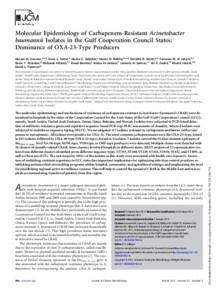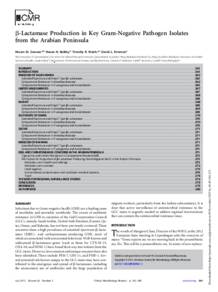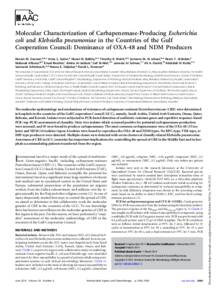Document
Molecular epidemiology of carbapenem-resistant acinetobacter baumannii isolates in the Gulf Cooperation Council states : dominance of OXA-23-type producers.
Identifier
DOI: 10.1128/JCM.02784-14
Contributors
Sartor, Anna L., Author
Sidjabat, Hanna E., Author
Balkhy, Hanan H., Author
Walsh, Timothy R., Author
Al-Johaniyah, Sameera M., Author
Al-Jindan, Reem Y., Author
Alfaresi, Mubarak., Author
Ibrahim, Emad., Author
ِAl-Jardaniyah, Amina., Author
Al-Salman, Jameela., Author
Dashti, Ali A., Author
Johani, Khalid., Author
Paterson, David L., Author
Publisher
American Society for Microbiology.
Gregorian
2015-03
Language
English
Subject
English abstract
The molecular epidemiology and mechanisms of resistance of carbapenem-resistant Acinetobacter baumannii (CRAB) were determined in hospitals in the states of the Cooperation Council for the Arab States of the Gulf (Gulf Cooperation Council [GCC]), namely, Saudi Arabia, United Arab Emirates, Oman, Qatar, Bahrain, and Kuwait. Isolates were subjected to PCR-based detection of antibiotic resistance genes and repetitive sequence-based PCR (rep-PCR) assessments of clonality. Selected isolates were subjected to multilocus sequence typing (MLST). We investigated 117 isolates resistant to carbapenem antibiotics (either imipenem or meropenem). All isolates were positive for OXA-51. The most common carbapenemases were the OXA-23-type, found in 107 isolates, followed by OXA-40-type (OXA-24-type), found in 5 isolates; 3 isolates carried the ISAba1 element upstream of blaOXA-51-type. No OXA-58-type, NDM-type, VIM-type, or IMP-type producers were detected. Multiple clones were detected with 16 clusters of clonally related CRAB. Some clusters involved hospitals in different states. MLST analysis of 15 representative isolates from different clusters identified seven different sequence types (ST195, ST208, ST229, ST436, ST450, ST452, and ST499), as well as three novel STs. The vast majority (84%) of the isolates in this study were associated with health care exposure. Awareness of multidrug-resistant organisms in GCC states has important implications for optimizing infection control practices; establishing antimicrobial stewardship programs within hospital, community, and agricultural settings; and emphasizing the need for establishing regional active surveillance systems. This will help to control the spread of CRAB in the Middle East and in hospitals accommodating transferred patients from this region.
Member of
ISSN
0095-1137
Resource URL
Category
Journal articles



